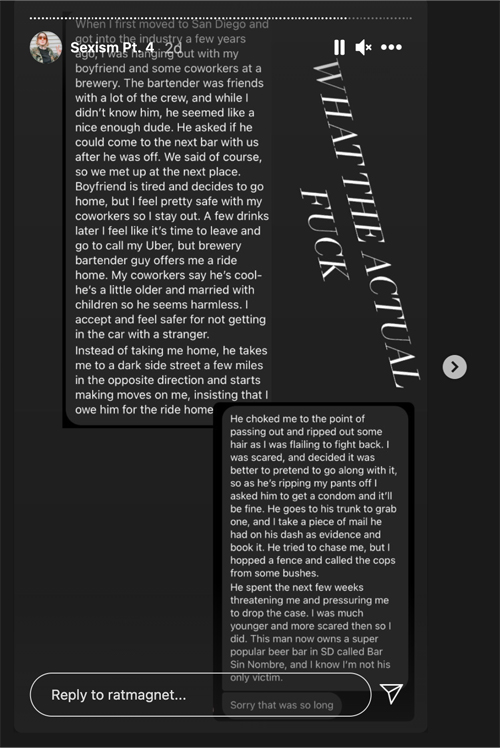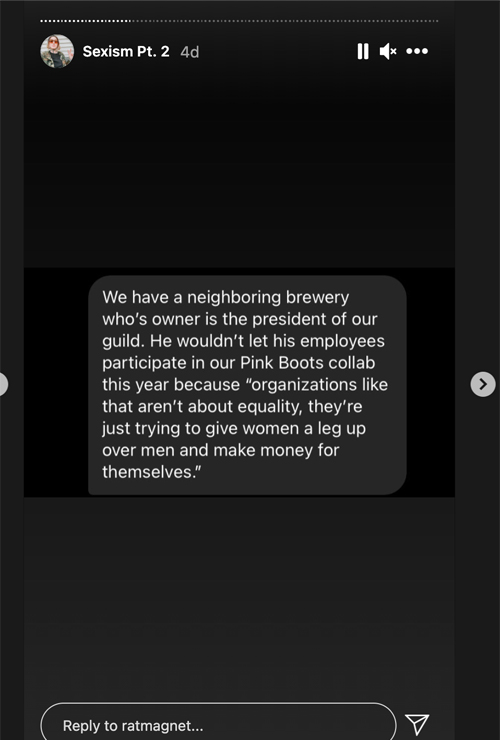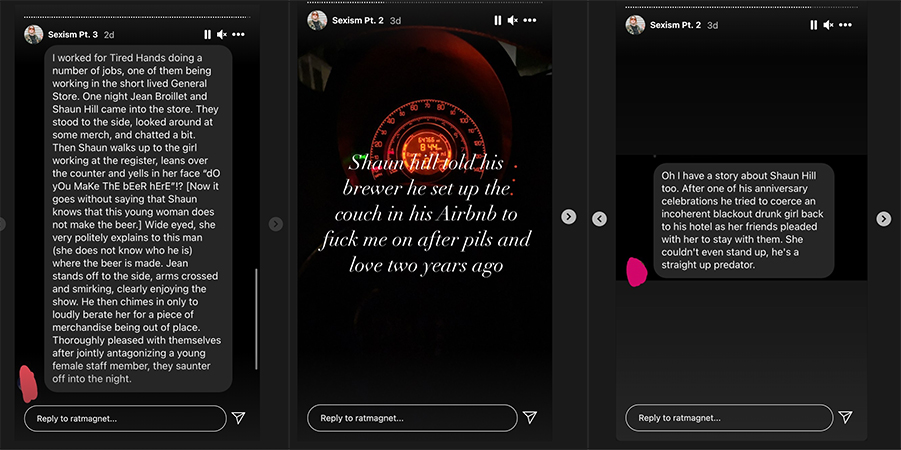Content warning: This story describes instances of sexual harassment and abuse.
What started last week on Tuesday, May 11 as an offhand request for women’s stories about experiencing sexism in the beer industry on a personal Instagram page has escalated into a mass callout of craft beer industry members across the world, sending shockwaves across the industry.
Thousands of messages — and counting — sent to brewer Brienne Allan (who goes by the Instagram handle @ratmagnet) include accusations against some of the beer world’s most lauded brewers and breweries: Shaun Hill, founder and brewer of Hill Farmstead; Jean Broillet, co-founder of Tired Hands Brewing; Jacob McKean, founder of Modern Times Beer, as well as Lord Hobo Brewing Company, Union Beer Distributors, BrewDog, and many others. Some allegations accuse brewery owners of complacency toward a toxic work culture under the shroud of progressivism; while others directly accuse individuals in the industry of sexual harassment, assault, and more.
Allan, production manager at Notch Brewing in Salem, Mass. and a former leader of the Pink Boots Society’s Boston chapter, was on-site at Notch’s forthcoming Boston area brewery to help assemble the new brewhouse. After being in Covid-19 quarantine for a year, she says, she’d gotten used to not having to deal with sexism, but it didn’t take long for it to rear its head once — then twice — more.
“The second time I leave the f*cking house, I got two in one day,” she says, explaining that two different men approached her to question her credentials for building the brewhouse, forcing her to validate her role, and thus her very existence.
Frustrated, she took to Instagram to collect similar accounts. “What sexist comments have you experienced?” she posted in her stories to her approximately 2,200 followers. Replies quickly rolled in, with descriptions of off-color comments and microaggressions familiar to many — if not all — women and femmes working in the beer industry (and most every male-dominated workforce). But before long, the stories began to reveal much more nefarious, deeper-seeded violence lurking in every corner of the industry.
As of Sunday, May 16, her original 2,200 Instagram followers have multiplied to upwards of 19,000, and the number keeps climbing as more people tune in from around the world and continue to share their own stories and experiences.
Allan admits she wasn’t prepared for the breadth and sheer volume of accounts, some of which detail extremely savage and predatory behavior. As the replies continue to snowball, reaching approximately 800 individual accounts at the time of reporting this article, she’s remained glued to her phone to sort through the thousands of messages she’s received. “I thought maybe it would die down, and it’s just getting worse,” she says. “I don’t know how to really handle it right now.”
Dealing with her own hurt through this process has been understandably difficult, with certain reports triggering traumatic responses. “The one that hit me the most was one of the girls told me that a brewer offered to give her a ride home, and everyone vouched for him, saying that he was a good guy,” Allan says. According to Allan, the story continued: “Then he pulled off to the side of the road and tried to rape her and beat the sh*t out of her. She got away, and she said she’s never told anybody because he was harassing her, [threatening], ‘If you ever tell anyone, I’ll kill you.’”
A History of Violence
Reader reactions to the hundreds of stories range from shock to grief. “I think it’s sickening, horrible, and unfortunately, not surprising in the least,” says Robin LeBlanc, beer columnist, author and podcast host of The Ontario Craft Beer Guide.
Ruvani de Silva, a freelance beer writer and diversity advocate, also says she is “not at all surprised.”
“What has really shaken me is the way that they [sexist men in the beer industry] have been shielded, in most cases, from any consequences for actions that range from inexcusably vulgar to worthy of prison time,” de Silva says.
Men in the beer industry are now facing their own roles as active and passive perpetrators in developing beer culture, as well admitting to their complacency around sexist comments and microaggressions against women in breweries and other social and professional environments. “Call it peer pressure, call it whatever, but this [behavior] was the norm for young men my age in the early 2000s,” says Matthew Curtis, founder and editor-in-chief of Pellicle Magazine. “I was too young, too cowardly, and too uninformed to be aware of the kind of damage [that] even the day-to-day microaggressions cause.” Curtis says he’s now actively working toward tangible steps to better support women and other marginalized groups, and to leverage his position for a more safe, equitable, and just industry.
Not all men are taking action, however. A thread about the ongoing controversy on BeerAdvocate’s messageboard contains a mix of replies ranging from outraged solidarity with women to dismissive skepticism of the screenshots and stories that Allan has shared. Some skepticism stems from the currently legally unverifiable nature of some incidents — were they jokes made in poor taste, or targeted harassment?
While there is no easy way to verify each claim, a number of people have come forward to corroborate certain incidents and repeat offenders, including Søren Wagner, founder and head brewer of Copenhagen’s Dry & Bitter Brewing Company, which publicly announced on Twitter that Wagner will take a leave of absence in light of the numerous allegations against him. Others accused by more than one person include Scot Blair of Hamilton’s Tavern, and Jeff Nelson of Connecticut Valley Brewing.
This independent verification, though legally tenuous, is seen among industry members as a unique aspect to this particular situation’s believability. “People are saying ‘I was there. I witnessed this,’” Allan says. Still, she feels the burden of absolute substantiation in a legal sense falls outside her role as the conduit of other people’s stories. “I was not looking to ruin anyone’s reputation, I just want to help people. I just hope it’s helping and not hurting.” She has even gone so far as to post a plea to the accused: “Please try to understand where your accusers are coming from.”
According to the National Sexual Violence Resource Center, between 2 and 10 percent of sexual assault accusations reported to law enforcement are false. However, the same organization estimates a majority of sexual assaults — 63 percent — are never reported. Fear of retribution, legal action, industry blacklisting, and physical safety are a few of the factors that deter women from reporting assault or harassment. In many instances, there simply isn’t an avenue to pursue charges — many small businesses lack human resource departments, and the beer industry currently does not have a unified, accessible avenue for reporting problems.
In late 2020, the BA released information about its new Complaint and Mediation Process to report offenders. To date, no reports have been made through the prohibitively difficult process that most industry employees don’t have access to, nor do consumers. In addition, any non-member or non-U.S. brewery remains exempt from that authority.
“The excuse that small breweries can’t afford proper HR [human resources] is just a way to entrench the boys-club, popularity-contest culture that has allowed the industry to become a safe haven for bigots and sexual predators,” says de Silva, “and it cannot be allowed to continue. The BA [Brewers Association] needs to bring in strict, enforceable rules about employee protection, on pain of dismissal.”
Instituting a “morality code” for problems that may fall outside the legal spectrum, but within the bounds of basic human decency, is another possible avenue, such as that put forth by the Pink Boots Society’s Codes of Conduct.
Nicki Werner, founder of the forthcoming brewery Jefferson Beer Supply in Jefferson, S. D., agrees the country’s largest trade organization representing the craft beer industry needs to step up, as do its members. “The Brewers Association should do more,” Werner says, noting that although the BA does currently employ equity and inclusion partner Dr. J. Nikol Jackson-Beckham, she’s only one person “who is already pulling a ton of weight.” What the Brewers Association can do, and what it chooses to do, remains murky.
Longtime members of the craft beer community are hesitant to hope for immediate change. “This is one of those things where I’m worried we’ll all talk about it, and then we don’t talk about it anymore,” says Em Sauter, Advanced Cicerone and founder/cartoonist at Pints and Panels. Robin LeBlanc is also cautiously optimistic: “There’s so much fear involved with just speaking out and talking about bad actors in positions of power, and it’s that fear and silence that abusers count on in order to keep thriving,” she says. “Dragging them out into the sun is a good first step, but there’s lots that still needs to be done.”
Early Repercussions Rolling In
Although Allan’s collection of women’s stories, saved so far in eight Highlights collections at the top of her Instagram profile, arguably accounts for the most widespread public callout of bad behavior against women in the beer industry, this is far from the first time the craft beer community has coalesced in outrage against racism, sexism, misogyny, and other inexcusable offenses. Public callouts of this nature have occurred in the craft beer industry earlier this year, when Boulevard Brewing Company was accused of discrimination and targeted harassment. But the magnitude and reach of this ongoing series of revelations by an Instagram user-slash-brewer has never been seen before. This is true figuratively and literally: “The way Brienne chained them altogether in the way she did is why it’s having such an impact. It’s a barrage instead of a sniper,” says Curtis, adding that the last year has left most people “feeling pretty raw.” “If there was ever a time something like this was gonna hit a nerve, it’s now.”
But as the beer community rallies to find a positive path forward after this avalanche of allegations, replies from the accused have begun to trickle in.
Hill Farmstead’s Shaun Hill Responds to Sexual Misconduct Allegations
VinePair reached out to a number of the accused breweries and received replies from two of them so far. Shaun Hill, brewmaster at Hill Farmstead in Greensboro Bend, Vt., responded via email to the numerous allegations made against him personally (which include accusations of sexually charged comments and predatory behavior), with a request that his statement be published in full:
“I have been reading and processing the recent comments and conversations taking place on social media in relation to both me as a person and the industry overall. I needed — and still need — a moment to reflect on the commentary, which has been serious in tone and tenor. To say it is unsettling is an understatement. I surely have a different perspective on what has been shared both overtly and anonymously, but what matters is how each person sees it. I think something that is uniformly apparent is the need to examine the environment of our industry and address how the entire community might move it, collectively, toward a place of shared respect, safety, personal responsibility, equitable conversation, and inclusive diversity.
I began in this business with the passion of creating a new and different way to consume beer. With that came a lot more than I anticipated. I have shown many human moments and will continue to do so, but I have never acted in a manner that was openly, willingly or consciously dismissive, degrading or threatening. I didn’t intend to be a visible presence in a community and I have been both honored and challenged with this unique role.
I want to share that I am listening because I believe that change for everyone only comes out of the willingness to engage in conversation, the freedom to share perspectives, and the desire to further the dialogue. I hope that others will join in that respectful quest. Such an ideal forum for discourse remains absent from our grasp, but it is within our reach.”
Unfortunately (and glaringly) absent are words like “apology,” “sorry,” or any acknowledgment of even unconscious misconduct at any time — a disappointingly common refrain in these situations.
Modern Times Beer Responds to Sexual Misconduct Accusations
Modern Times Beer in San Diego, Calif., also faced a number of company-wide and employee-specific accusations. Dan Reed, director of marketing at Modern Times, replied to VinePair with the following statement:
“First and foremost, we want to deeply apologize to anyone who has been harassed, discriminated against, prevented from succeeding, and otherwise hurt, either as our employee or by one of our employees. We can do better and be better, both as individuals and an organization. As to the specifics (or as specific as we can get here), some of the things detailed in these experiences are things we are aware of and have taken action on, and some of them we are processing in real-time along with everyone else.
If we truly want to see seismic shifts in our industry, that means acknowledging that we’re going to be rattled by some of the shockwaves. We recognize that what’s happening right now is incredibly important, necessary, and we’re doing our best to actively listen to the experiences that people are sharing, and to give them the space to share them. Shifts away from entrenched power structures and toward meaningful equity are always going to be uncomfortable, and it is difficult to be confronted by experiences of misogyny, racism, and oppression that have happened in our space, on our watch, but the truth is that they happen. We use words like ‘systemic’ for a reason; it’s because the roots of these injustices run beneath the whole of our industry, and they touch us all.
As a company, we take stances that oppose toxic culture and systemic oppression, but that doesn’t mean that we’re immune to them. We commit ourselves to doing the work, but that doesn’t mean we don’t have work to do. We are a company of 300+ employees that exists in a national system of patriarchy, white supremacy, and oppression, and — while this will not be the last time we fail — we will always keep trying to move forward. We will continue to critically examine our internal power structure, improve the way we listen to the voices of marginalized employees, and to remember that sometimes getting called out is the only way to recognize your blind spots.
Again, we apologize to anyone who has been hurt at Modern Times, or by a Modern Times employee. We also realize that a response in words is just that — words. But we are truly committed to owning and fixing our mistakes, to listening to where we got it wrong, and to continuing to try to get it right.”
What those commitments look like remain to be seen.
Why This Many, Why Now, and What Happens Next?
Charlotte Cook, head brewer at Coalition Brewing in London, believes that the volume of submissions “snowballed” due to perceived safety in numbers. She also describes a sense of personal empowerment and validation from these stories. “I sat on things for years, afraid to say things out of a fear I’d be ostracized or face professional repercussions,” says Cook. “But if there’s a wave of accusations, people feel less scared of being singled out and perhaps [protected] with supporters. It’s a real cascade of anger and vindication.”
Activists such as April Boyce and Tas Fraser of the #NoAppleogies project, beginning in the cider business and expanding into beverage alcohol as a whole, have both been systematically calling out bad actors in these industries, with mixed success. Social media boycotts, like the one organized in the wake of Founders Brewing Company’s racial discrimination lawsuit, tend to quickly spring up when controversies arise.
Individual efforts like these, though noble and completely necessary, have yet to yield much more than industry insider awareness. Some, like Cook, recommend unionizing; others seek the development of more punitive repercussions for breweries that are part of larger trade organizations.
Allan doesn’t plan on remaining a solitary messenger indefinitely — especially as she continues to share the rising number of legal threats she’s receiving, presumably from some individuals named in the anonymous accounts. Security concerns about allowing other people to access her social media prevent her from sharing her personal account login and password with others, and she admits this is more than she bargained for. While she’s appreciative of the unsolicited funds people have sent her on Venmo to support the movement and her mental health, she’s not planning on keeping it for herself. “I’m not doing this for money,” she says. Rather, she says, “I’m obviously going to donate it all,” likely to an organization or organizations that support victims of sexual violence.
Groups across the world are already rallying to keep up the momentum. Burum Collective put out a call for U.K.-based activists to meet. The Good Hop Bottle Shop in Oakland, Calif., has pledged not to carry any of the breweries named in the allegations. But as the industry recovers from the initial shock of these revelations, those within the craft beer community are sincerely hoping individual efforts will also continue. “It’s important that this isn’t a blip and those with a voice continue to shout about this sh*t,” Cook says.
Curtis agrees, adding that the onus of core change lies more firmly than ever in the hands of those who habitually perpetuate violent scenarios: men.
“The next time something happens in a bar, or at a festival, will someone speak up?” Curtis wonders, adding, “I hope Brienne and other women in the industry keep piling this on until men like myself feel like they have no choice. We deserve everything we’re getting.”
Ed. note: VinePair does not confirm the veracity of any account referenced in this story.
This story is a part of VP Pro, our free platform and newsletter for drinks industry professionals, covering wine, beer, liquor, and beyond. Sign up for VP Pro now!



